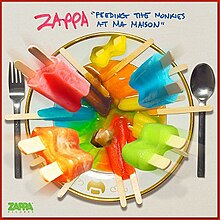
Frank Vincent Zappa was an American musician, composer, and bandleader. His work is characterized by nonconformity, free-form improvisation, sound experimentation, musical virtuosity and satire of American culture. In a career spanning more than 30 years, Zappa composed rock, pop, jazz, jazz fusion, orchestral and musique concrète works, and produced almost all of the 60-plus albums that he released with his band the Mothers of Invention and as a solo artist. Zappa also directed feature-length films and music videos, and designed album covers. He is considered one of the most innovative and stylistically diverse musicians of his generation.

New England Digital Corporation (1976–1993) was founded in Norwich, Vermont, and relocated to White River Junction, Vermont. It was best known for its signature product, the Synclavier Synthesizer System, which evolved into the Synclavier Digital Audio System or "Tapeless Studio." The company sold an FM digital synthesizer/16-bit polyphonic synthesizer and magnetic disk-based non-linear 16-bit digital recording product, referred to as the "Post-Pro."

The Synclavier is an early digital synthesizer, polyphonic digital sampling system, and music workstation manufactured by New England Digital Corporation of Norwich, Vermont. It was produced in various forms from the late 1970s into the early 1990s. The instrument has been used by prominent musicians.

Dweezil Zappa is an American rock guitarist and occasional actor. He is the son of musical composer and performer Frank Zappa. Exposed to the music industry from an early age, Dweezil developed a strong affinity for playing the guitar and producing music. Able to learn directly from guitarists such as Steve Vai and Eddie Van Halen, Dweezil released his first single at the age of 12.

Civilization Phaze III is the sixty-third album by Frank Zappa, released posthumously as a double album on October 31, 1994. It was the first studio album of new material from Zappa since 1986's Jazz from Hell. The album marks the third part of a conceptual continuity that started with We're Only in It for the Money (1968), with the second part being a re-edited version of Zappa's 1967 album Lumpy Gravy. Zappa described the album as a "two-act opera", but in lieu of traditional recitatives and arias, it alternates brief spoken word passages with musical numbers created on a Synclavier using a combination of sampled and synthesized sounds. Much of the sampled material in the second half of the album was originally recorded by Ensemble Modern and other musicians to Zappa's specifications.

Jazz from Hell is an instrumental album whose selections were all composed and recorded by American musician Frank Zappa. It was released on November 15, 1986 by Barking Pumpkin Records on vinyl and cassette, and in 1987 by Rykodisc on CD.
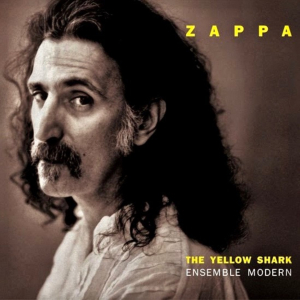
The Yellow Shark is an album of orchestral music by American musician Frank Zappa. Released in November 1993, it was the last Zappa album released in his lifetime, almost exactly a month before he died of the cancer from which he had suffered for several years. It features live recordings from the Ensemble Modern's 1992 performances of Zappa's compositions. In the album's notes, Zappa describes The Yellow Shark as one of the most fulfilling projects of his career, and as the best representation of his orchestral works.

Thing-Fish is an album by Frank Zappa, originally released as a triple album box set on Barking Pumpkin Records in 1984. It was billed as a cast recording for a proposed musical of the same name, which was ultimately not produced by Zappa, but later performed partially in 2003, ten years after his death.

FZ:OZ is a live album by Frank Zappa, released in 2002 as a two-CD set and is the first release on the Vaulternative Records label from the Zappa Family Trust. It contains almost all of the January 20, 1976 concert at the Hordern Pavilion in Sydney, Australia.
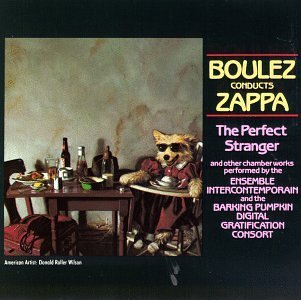
The Perfect Stranger is a 1984 album featuring the music of Frank Zappa, conducted in part by Pierre Boulez. It was originally issued on vinyl in 1984 and on CD in 1985 by Angel, and then in remixed and resequenced form on CD by Barking Pumpkin in 1991. Later reissues were by Rykodisc in 1995 and Zappa/Universal in 2012.

Frank Zappa Meets the Mothers of Prevention is a 1985 album by Frank Zappa. The album was originally released in two slightly different versions in the US and Europe.

The Lost Episodes is a 1996 posthumous album by Frank Zappa which compiles previously unreleased material. Much of the material covered dates from early in his career, and as early as 1958, into the mid-1970s. Zappa had been working on these tracks in the years before his death in 1993.

Video from Hell is a video released in 1987 by Frank Zappa. It is a compilation of pieces of music and video from a series of projects that Zappa presumably planned to finish and release for home video, including a companion video for the You Can't Do That On Stage Anymore series of albums, but those projects were ultimately never completed. Many pieces from this video had appeared on a one-hour Night Flight special entitled "You Are What You Watch". The music video for the song "G-Spot Tornado" features color 8mm footage that Zappa shot at a county fair in the early 1960s, while the music video for "Night School" features footage from the making of his feature film 200 Motels. It also features the music video for "You Are What You Is" which was banned by MTV. A guitar solo duet between Zappa and Steve Vai taken from the song "Stevie's Spanking" was later released on You Can't Do That On Stage Anymore, Vol. 4. As of December 2011, the video has not yet been released on DVD.
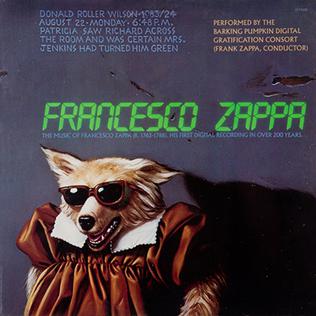
Francesco Zappa is a 1984 album by Frank Zappa. It features chamber music by the Italian composer Francesco Zappa, who composed between 1763 and 1788.
Zappa Records is an American record label based in Los Angeles which was founded by Frank Zappa in 1977. It was mostly inactive during the 1980s and 1990s, but was revived in 2006 by the Zappa Family Trust.
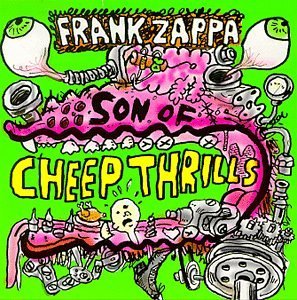
Son of Cheep Thrills is a compilation album by Frank Zappa, with material from previously released albums.
Jim "Motorhead" Sherwood was an American rock musician notable for playing soprano, tenor and baritone saxophone, tambourine, vocals and vocal sound effects in Frank Zappa's Mothers of Invention. He appeared on all the albums of the original Mothers line-up and the 'posthumous' releases Burnt Weeny Sandwich and Weasels Ripped My Flesh, as well as certain subsequent Zappa albums. He also appeared in the films 200 Motels, Video from Hell and Uncle Meat.

Dance Me This is an album by Frank Zappa. Released posthumously in June 2015, it was among the last releases completed by Zappa before his death, along with The Rage & The Fury: The Music Of Edgard Varèse, Trance-Fusion and Civilization Phaze III.

Frank Zappa for President is a compilation album by American musician Frank Zappa, released in July 2016, consisting of unreleased compositions played on the Synclavier and unheard tracks relating to the uniting political thread that ties it all together.
"G-Spot Tornado" is a piece of programmed Synclavier DMS music written by American musician Frank Zappa, released in 1986 on his instrumental album Jazz from Hell.
